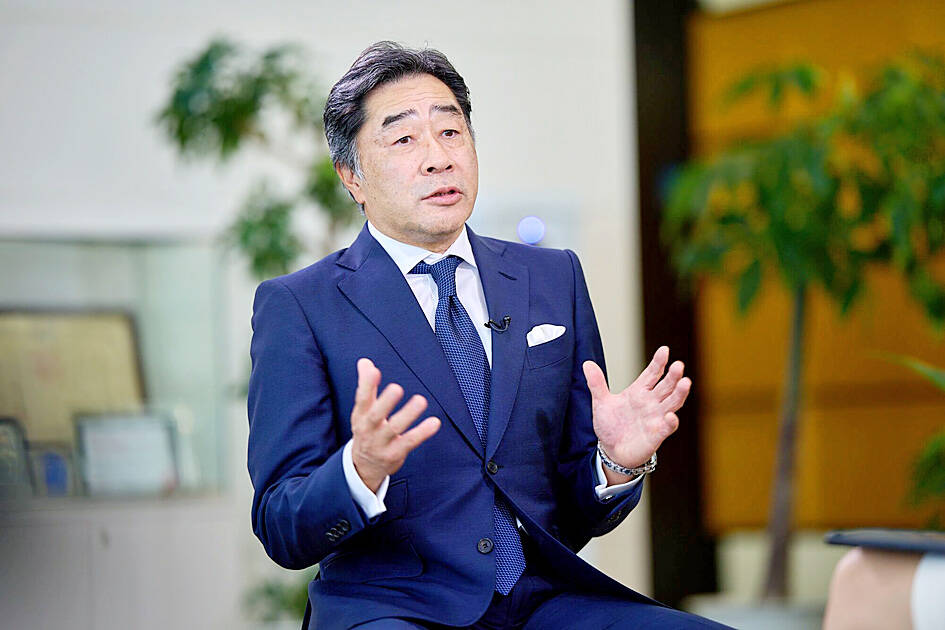Tokyo Electron Ltd is seeking to build a team of chip engineers in India to take advantage of the push by Indian Prime Minister Narendra Modi’s government for more semiconductor manufacturing in the world’s most populous country.
Japan’s biggest chip equipment maker plans to hire and train local engineers in or around 2026, with their first task to provide technical services to Tata Electronics Pvt, Tokyo Electron chief executive officer Toshiki Kawai said.
Robotics would play a growing role and local staff would be provided with in-person and remote support from Japan, he added, declining to specify how many people the company would need to hire.

Photo: Bloomberg
India is amping up efforts to attract international electronics companies and chipmakers to set up facilities within its borders, under a plan by the Modi administration to close the tech gap with advanced economies.
Apple Inc is accelerating its production and sales of iPhones in the country, while Tata Group and others are investing billions of dollars in semiconductor fabrication plants.
The government is providing incentives to support those ventures, which would need machinery and know-how from companies like Tokyo Electron.
The Tokyo-based company has set a target of 10,000 new hires globally over the next five years, as more countries race to build chips at home. Tokyo Electron supplies equipment to Taiwan Semiconductor Manufacturing Co (台積電), Samsung Electronics Co, SK Hynix Inc and Intel Corp, and its forecast for the business year to March points to record revenue and operating profit.
It also expects overall chip demand to double by 2030, boosted by artificial intelligence, autonomous cars and a push toward energy efficiency and decarbonization.
That is even as the US pressures Japan to further tighten restrictions on exports of advanced chipmaking gear to China, part of an extended effort to curb its technological progress.
US officials have sought to limit Tokyo Electron’s ability to service some of its machines in China and have talked of invoking the foreign direct product rule, which allows Washington to control sales of products made anywhere in the world if they use even a small amount of US technology.
Such moves would not affect global appetite for chipmaking machines, 61-year-old Kawai said.
“The importance of semiconductors remains unchanged. There will always be investment somewhere,” he said.
Tokyo Electron said earlier this month it would help train Tata Electronics’ workforce on chip-making equipment and support its research and development.
Modi’s administration has so far approved more than US$15 billion of semiconductor investments, including US memorychip maker Micron Technology Inc’s plan for a US$2.75 billion assembly facility.
Israel’s Tower Semiconductor Ltd is also seeking to partner with Indian billionaire Gautam Adani on a US$10 billion fabrication plant in western India.
Sales to China, which surged to about 50 percent of Tokyo Electron’s revenue in the June quarter, would likely fall to less than 40 percent in October-March, and comprise about 25 percent to 30 percent in the future as overall sales of equipment rise, Kawai said.
“India won’t replace the Chinese market. It would be growth in addition to China,” he said.

The US dollar was trading at NT$29.7 at 10am today on the Taipei Foreign Exchange, as the New Taiwan dollar gained NT$1.364 from the previous close last week. The NT dollar continued to rise today, after surging 3.07 percent on Friday. After opening at NT$30.91, the NT dollar gained more than NT$1 in just 15 minutes, briefly passing the NT$30 mark. Before the US Department of the Treasury's semi-annual currency report came out, expectations that the NT dollar would keep rising were already building. The NT dollar on Friday closed at NT$31.064, up by NT$0.953 — a 3.07 percent single-day gain. Today,

‘SHORT TERM’: The local currency would likely remain strong in the near term, driven by anticipated US trade pressure, capital inflows and expectations of a US Fed rate cut The US dollar is expected to fall below NT$30 in the near term, as traders anticipate increased pressure from Washington for Taiwan to allow the New Taiwan dollar to appreciate, Cathay United Bank (國泰世華銀行) chief economist Lin Chi-chao (林啟超) said. Following a sharp drop in the greenback against the NT dollar on Friday, Lin told the Central News Agency that the local currency is likely to remain strong in the short term, driven in part by market psychology surrounding anticipated US policy pressure. On Friday, the US dollar fell NT$0.953, or 3.07 percent, closing at NT$31.064 — its lowest level since Jan.

The New Taiwan dollar and Taiwanese stocks surged on signs that trade tensions between the world’s top two economies might start easing and as US tech earnings boosted the outlook of the nation’s semiconductor exports. The NT dollar strengthened as much as 3.8 percent versus the US dollar to 30.815, the biggest intraday gain since January 2011, closing at NT$31.064. The benchmark TAIEX jumped 2.73 percent to outperform the region’s equity gauges. Outlook for global trade improved after China said it is assessing possible trade talks with the US, providing a boost for the nation’s currency and shares. As the NT dollar

The Financial Supervisory Commission (FSC) yesterday met with some of the nation’s largest insurance companies as a skyrocketing New Taiwan dollar piles pressure on their hundreds of billions of dollars in US bond investments. The commission has asked some life insurance firms, among the biggest Asian holders of US debt, to discuss how the rapidly strengthening NT dollar has impacted their operations, people familiar with the matter said. The meeting took place as the NT dollar jumped as much as 5 percent yesterday, its biggest intraday gain in more than three decades. The local currency surged as exporters rushed to